When you ask, "what does business intelligence mean," you seek a way to turn your data into clear, actionable insights. Business intelligence helps you analyze information, spot trends, and make better decisions. Today, modern business intelligence tools have become essential as companies handle more data than ever.
| Metric / Insight | Value / Description |
|---|---|
| Increase in BI analytics utilization since pre-pandemic | 49% of companies increased |
| Fortune 500 companies adopting AI-powered BI | Over 85% adoption rate |
| Global BI software market size (2025) | $47.48 billion |

When you ask, "what does bi mean," you want to know how companies turn information into results. Business intelligence is a process that helps you collect, organize, and analyze data from many sources. You use it to find patterns, spot trends, and answer important questions about your business. According to leading industry analysts, business intelligence is a technology-driven process that gathers, analyzes, and visually presents data. This process transforms raw numbers into actionable insights that guide your decisions.
You do not need to be a data expert to use business intelligence. Modern business intelligence tools make it easy for you to connect to different data sources, such as spreadsheets, databases, or cloud apps. These tools help you see your data in charts, dashboards, and reports. You can track key performance indicators (KPIs), monitor business goals, and share findings with your team. With business intelligence, you can move beyond simple data analysis and start making decisions based on facts, not guesses.
Tip: Business intelligence combines data analytics, reporting, and visualization. You get a complete view of your business, which helps you act quickly and confidently.
Here is a simple comparison to help you understand how business intelligence stands out from traditional data analysis:
| Aspect | Business Intelligence (Traditional) | Data Analytics (Modern) |
|---|---|---|
| Orientation | Looks at past performance | Predicts future trends |
| Data Sources | Uses structured, internal data | Uses both structured and unstructured data |
| Outputs | Creates reports, dashboards, and KPIs | Builds interactive tools and predictive models |
| Insights | Describes what happened | Explains why it happened and what might happen next |
| Actions | Supports strategic management | Enables proactive, forward-thinking decisions |
| User Interaction | Often needs skilled analysts | Lets business users explore data easily |
The main goal of business intelligence is to help you make better decisions. You use it to turn raw data into actionable insights that drive your business forward. Business intelligence systems collect and manage information from across your organization. They use dashboards, charts, and reports to show you what is happening in real time. You can track sales, monitor customer behavior, and measure performance against your goals.
Business intelligence supports your business analytics by helping you:
You gain more than just numbers. Business intelligence gives you a 360-degree view of your operations. You can identify new opportunities, reduce risks, and improve efficiency. You also foster collaboration by sharing data insights across teams. With business intelligence, you empower everyone in your organization to make informed choices.
Note: Business intelligence helps you stay ahead by turning information into a strategic asset. You can respond faster to changes, serve your customers better, and achieve your business goals.
To sum up, when you wonder, "what does business intelligence mean," remember that it is your toolkit for transforming data into value. You use it to support business analytics, improve decision-making, and gain a competitive edge in today’s fast-moving world.
Business intelligence helps you turn raw data into valuable insights. You follow a clear process that starts with data collection and ends with sharing results. Let’s look at how you can use business intelligence tools and platforms like FanRuan and FineBI to make this process simple and effective.
You begin with data collection and integration. You gather information from many sources, such as spreadsheets, databases, and cloud apps. FanRuan’s FineDataLink platform lets you connect to over 100 data sources. You can synchronize data in real time and use ETL tools to clean and prepare your data. This step ensures your data is accurate and ready for analysis. You avoid data silos and make sure everyone in your company works with the same information.
Tip: Good data integration is the foundation of self-service business intelligence. It helps you build a reliable data layer for all your analysis and reporting needs.
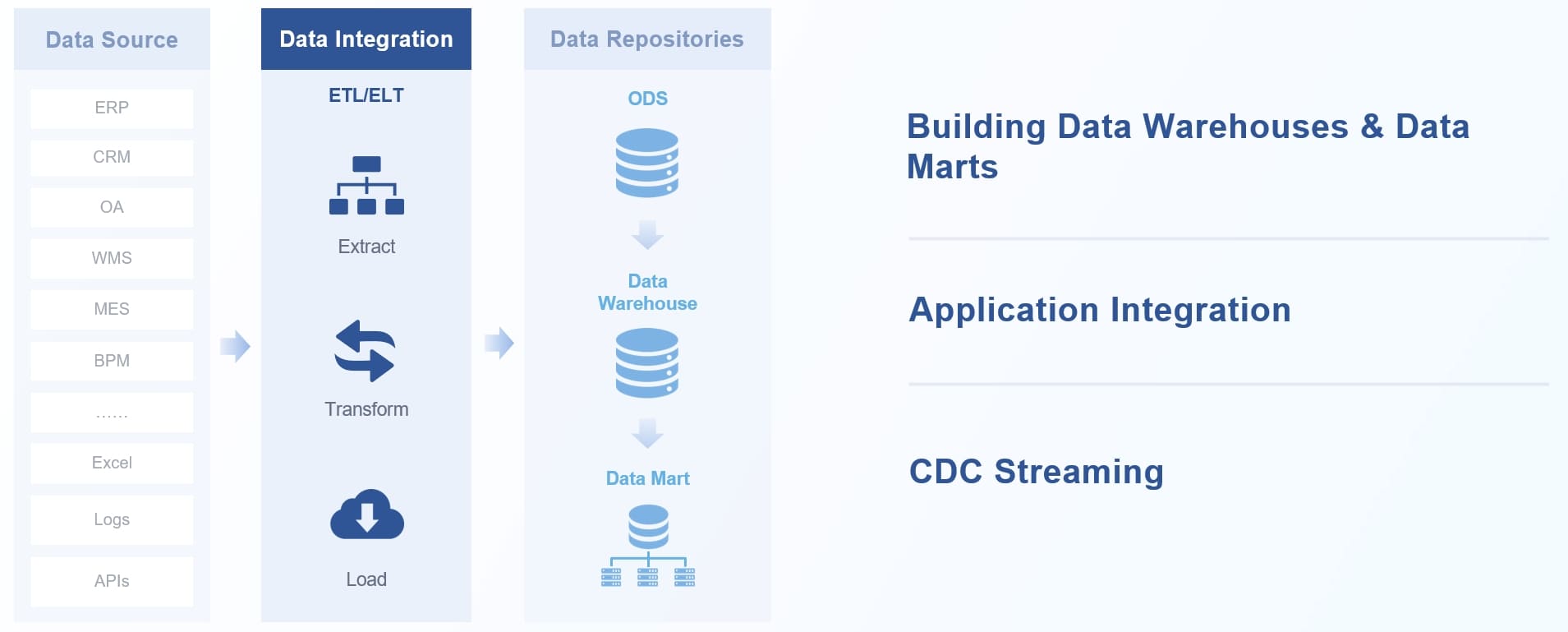
Once your data is ready, you move to data analysis and visualization. FineBI, a leading business intelligence tool, allows you to connect directly to your data sources. You can create self-service datasets, join tables, and perform calculations without writing code. FineBI supports many chart types, including bar, line, and pie charts. You can drag and drop fields to build dashboards that show trends and key metrics. These dashboards update in real time, so you always see the latest results.
| Feature | Benefit |
|---|---|
| Self-service datasets | Easy data analysis for all users |
| Real-time dashboards | Up-to-date insights at any moment |
| Rich chart options | Flexible and clear data visualization |
| Cross-device support | Access dashboards on desktop or mobile |
Self-service business intelligence means you do not need IT support for every report. You explore data, spot trends, and answer questions on your own. FineBI’s dashboards make data analysis and reporting fast and interactive.
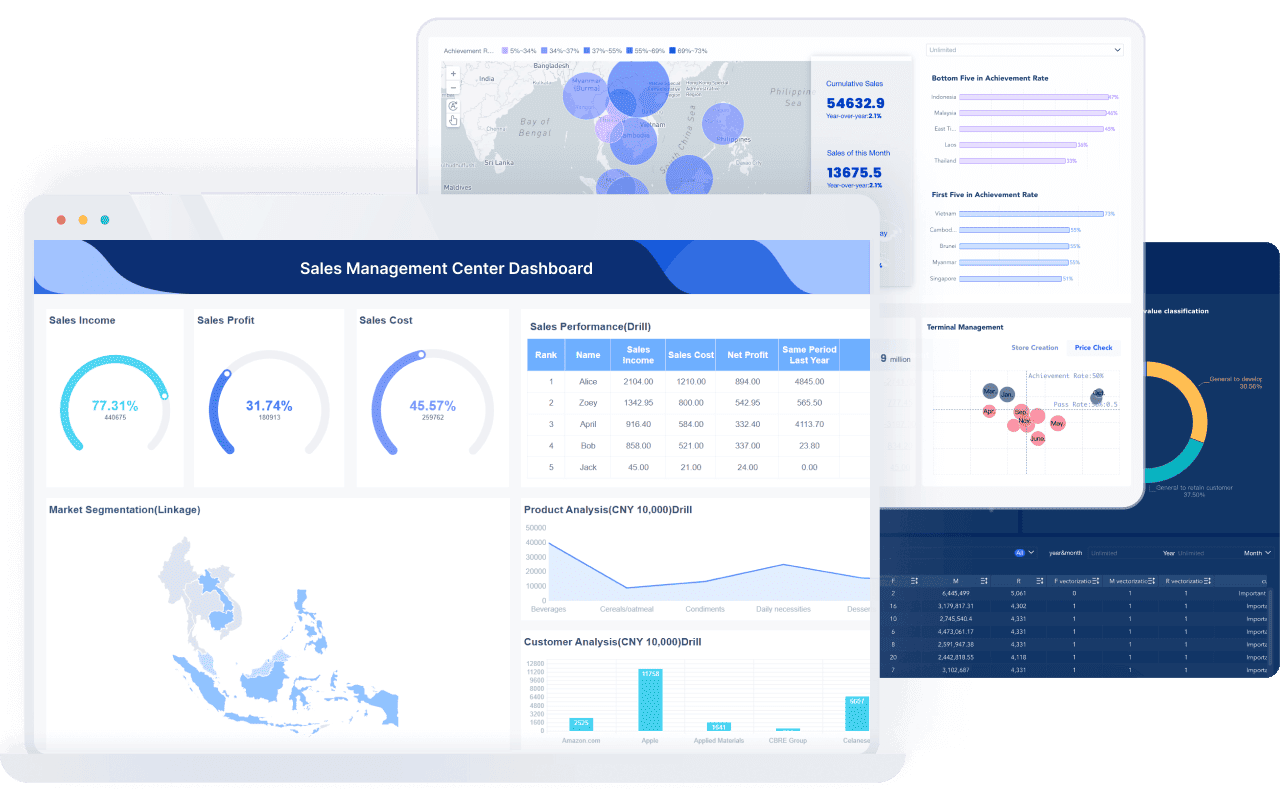
After you analyze your data, you need to share your findings. FineBI lets you publish dashboards and reports with just a few clicks. You can set permissions, so only the right people see sensitive information. You share dashboards through secure links or export them as files. This makes collaboration easy and keeps everyone informed.
Business intelligence platforms like FanRuan and FineBI help you move from data collection and integration to analysis, data visualization, and data reporting. You gain a complete view of your business and make better decisions every day.
Business intelligence shapes the way you run your business in today’s fast-paced world. You rely on it to make better decisions, boost productivity, stay ahead of competitors, and understand your customers. Let’s explore how business intelligence benefits you in these key areas.
You want to make decisions based on facts, not guesses. Business intelligence gives you the tools to do just that. When you use business intelligence, you turn raw data into clear data insights. You see trends, spot problems early, and act quickly. FineBI, for example, lets you build dashboards that show real-time performance. You can track sales, monitor inventory, and measure customer satisfaction—all in one place.
Here’s what you gain when you use business intelligence for decision-making:
When you adopt a business intelligence strategy, you empower your team to make data-driven decisions. You avoid costly mistakes and seize new opportunities as soon as they appear.
You can measure the impact of business intelligence on your decisions in several ways:
Clients using business intelligence tools like FineBI report that leadership gains access to clear, accurate data visualization. This leads to more informed decision-making and better business outcomes.
Business intelligence transforms the way you work. You save time by automating manual tasks and streamlining workflows. FineBI, for instance, lets you connect to multiple data sources and create reports without writing code. You spend less time gathering data and more time analyzing it.
The impact on productivity is clear. Studies show that business intelligence and AI can boost productivity by an average of 66%. Here’s a look at how different business tasks improve with these tools:
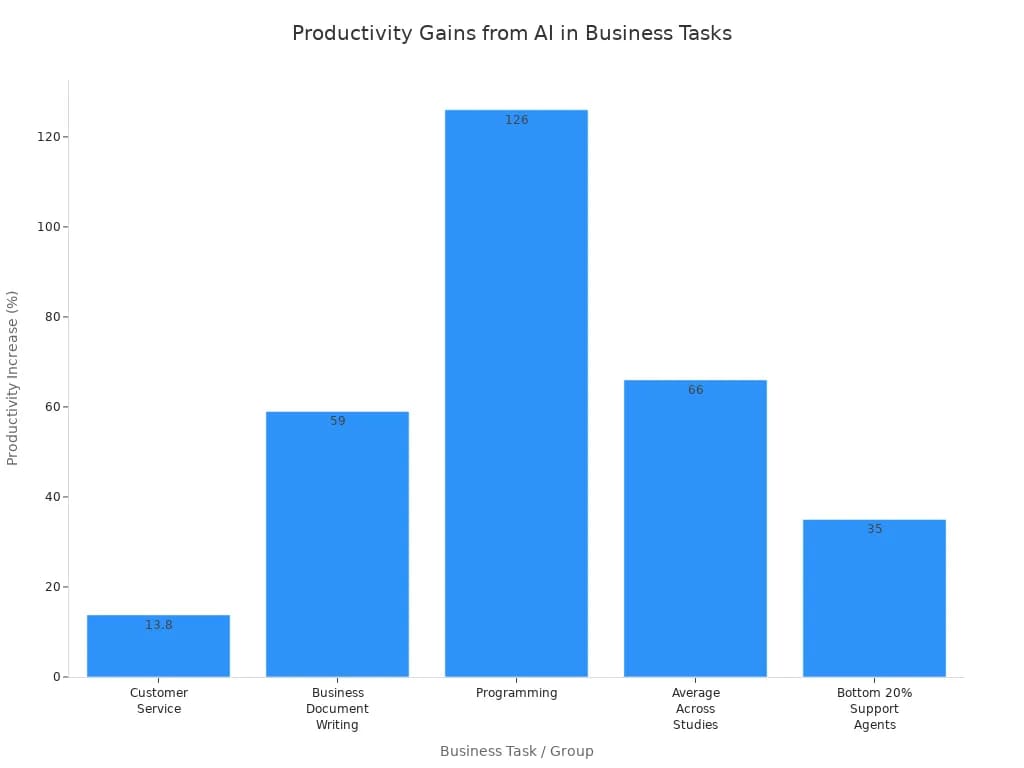
| Business Task | Productivity Increase with AI Assistance | Quality Impact |
|---|---|---|
| Customer Service | 13.8% more inquiries handled per hour | Quality maintained or improved |
| Business Document Writing | 59% more documents written per hour | Quality rating improved |
| Programming | 126% more projects coded per week | Significant productivity gains |
You see these gains in your daily work. Automated alerts, real-time dashboards, and easy data sharing mean you respond faster and avoid delays. FineBI’s self-service features let everyone in your organization access the data they need, which boosts efficiency and supports informed decision-making.
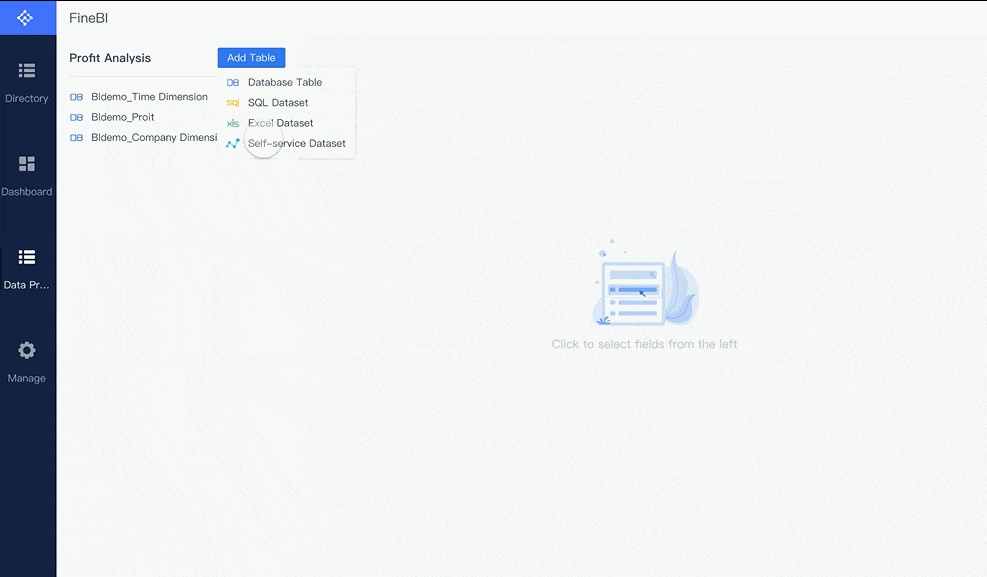
Staying ahead of your competitors requires more than just hard work. You need to know what’s happening inside and outside your business. Business intelligence gives you that edge. You analyze your own operations and compare them to industry benchmarks. You spot trends before your competitors do and adjust your strategy quickly.
Modern business intelligence tools like FineBI use advanced analytics, AI, and real-time data processing. You get descriptive, predictive, and prescriptive analytics that help you understand the past, forecast the future, and decide what to do next. You also monitor your brand, track market activity, and manage reputational risks.
Many leading companies use business intelligence to drive innovation and agility. For example, Nike leverages AI-powered analytics to gain deeper consumer insights and improve sales. By integrating business intelligence with competitive intelligence, you align your internal strengths with market demands. This approach helps you maintain your competitive advantage and grow your business.
Understanding your customers is key to success. Business intelligence helps you collect and analyze customer data from many sources. You learn what your customers want, how they behave, and how you can serve them better. FineBI enables you to build dashboards that track customer journeys, segment audiences, and measure satisfaction.
Here are some real-world examples of companies using business intelligence for customer insights:
| Company | Industry | BI Use Case Description | Results/Impact |
|---|---|---|---|
| Delta Airlines | Travel | Tracks frequent fliers and personalizes service using BI dashboards. | Improved loyalty and operational decisions. |
| REI | Retail | Uses BI and machine learning to analyze customer metrics and boost membership sign-ups. | Streamlined processes and better targeting. |
| Expedia | Travel | Replaced manual data collection with BI for customer satisfaction analysis. | Better understanding of customer needs and improved service strategies. |
| Lotte.com | E-commerce | Analyzes shopping cart abandonment to improve checkout and delivery. | Increased loyalty and $10 million in additional sales. |
| American Express | Finance | Uses BI to identify at-risk customers and detect fraud. | Retained up to 24% of at-risk customers and enhanced fraud protection. |
You can see how business intelligence benefits organizations across industries. You gain a 360-degree view of your customers, which helps you deliver better experiences and build stronger relationships.
Business intelligence is not just about technology. It is about empowering you to make smarter decisions, work more efficiently, outpace your competitors, and understand your customers. When you invest in business intelligence, you invest in the future of your business.
When you start your journey with business intelligence, you need to choose the right tool for your needs. FineBI stands out among business intelligence tools because it combines ease of use with powerful features. You should look for a solution that matches your business goals and analytics needs. Consider these factors:
FineBI offers a no-code interface, real-time analytics, and mobile support. You can connect to many data sources and enjoy fast performance, even with large data sets. This makes FineBI a strong choice for organizations of all sizes.
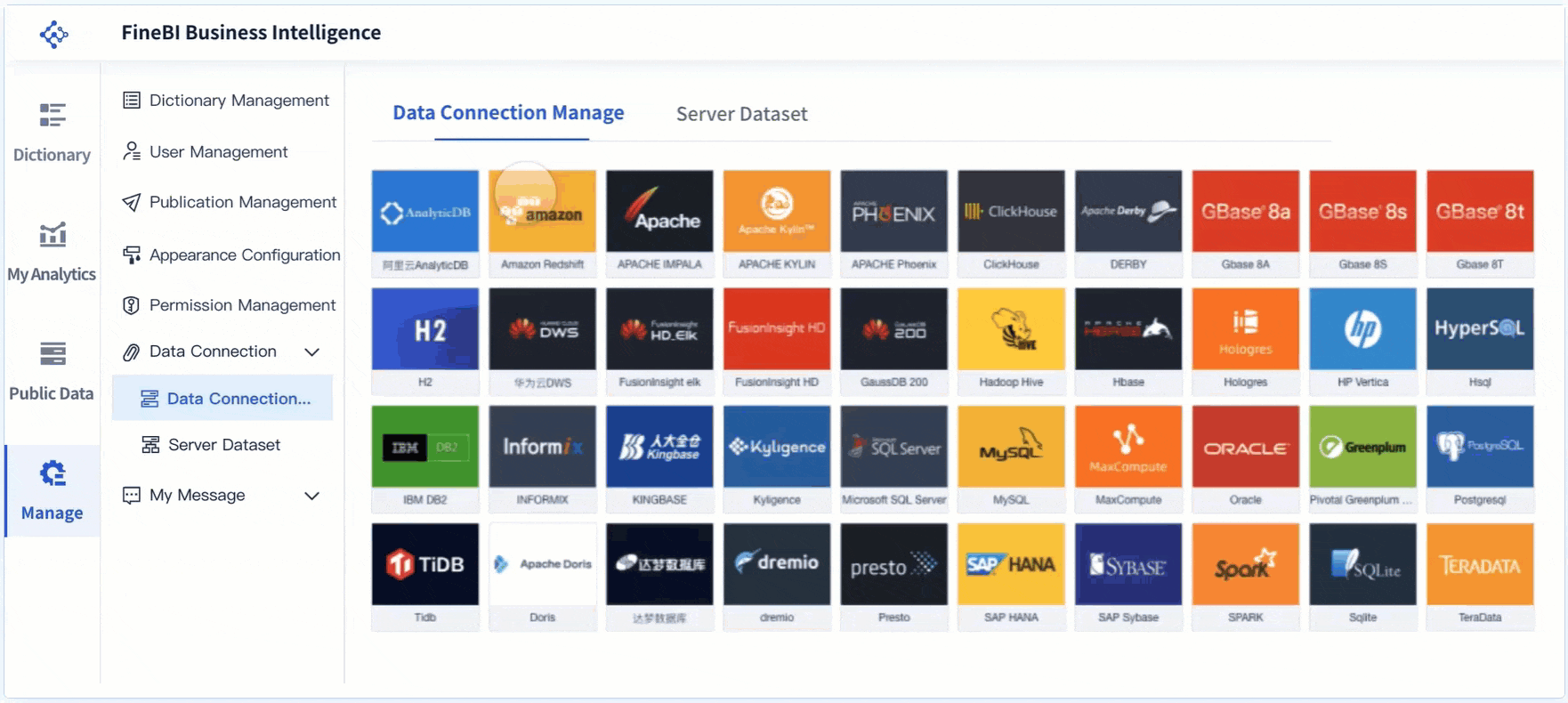
To achieve a successful business intelligence implementation, you need a clear plan. Follow these steps to get started with FineBI:
Tip: A well-structured approach helps you manage data, control access, and ensure your business intelligence tools deliver real value.
You may face challenges during business intelligence implementation. Common issues include data quality, integration, and user adoption. To overcome these:
FanRuan solutions, like FineBI, offer customization, scalability, and strong security. You can tailor dashboards to your industry and business size. With expert support and easy-to-use interfaces, you set your team up for a successful business intelligence implementation.
Business intelligence gives you the power to transform your organization. When you use platforms like FineBI, you gain:
| BI Objective | Description |
|---|---|
| Customer Insights | Personalize marketing and improve satisfaction |
| Operational Optimization | Boost productivity and resource use |
| Revenue Growth | Drive sales with data-driven strategies |
| Strategic Decision-Making | Align actions with business goals |
Start your business intelligence journey by building a strong data platform, empowering users, and focusing on real business needs. With FanRuan and FineBI, you can unlock these long-term benefits and lead your team into a smarter, more competitive future.
Click the banner below to try FineBI for free and empower your enterprise to transform data into productivity!
Business Intelligence Solutions: Every Thing You Need to Know

The Author
Lewis
Senior Data Analyst at FanRuan
Related Articles
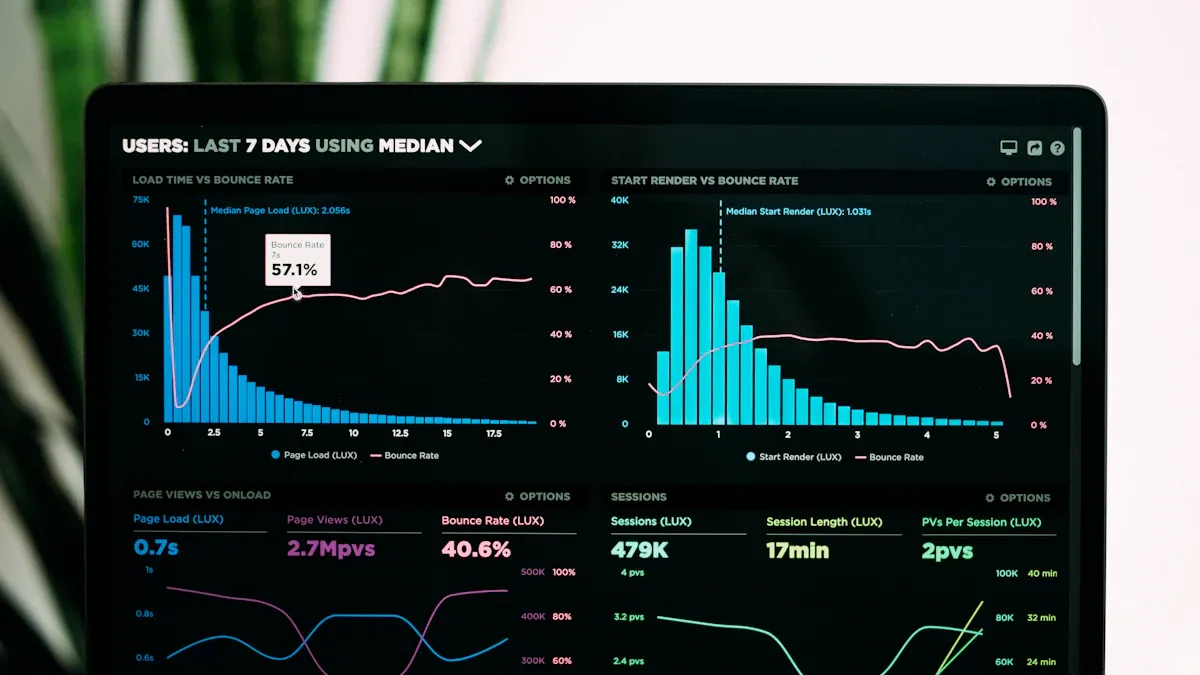
What is a Business Intelligence System and How Does It Work
A business intelligence system collects, analyzes, and visualizes data, turning raw information into actionable insights for smarter business decisions.
Lewis
Jan 04, 2026

Top 3 Retail Management Software Picks
Compare the top 3 retail management software. See features, pricing, and which solution fits your business needs for inventory and sales.
Lewis
Dec 30, 2025

What Are Enterprise BI Solutions and How Do They Work
Enterprise BI solutions unify business data, enabling real-time analytics, secure collaboration, and smarter decision-making across your organization.
Lewis
Dec 22, 2025